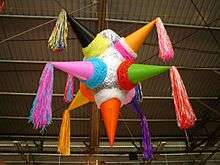pinata
See also: piñata
English

Alternative forms
Etymology
From Mexican Spanish piñata, from piña, from Latin pinea (“pinecone”), because its paper cover (on traditional making) resembles one. Alternatively from Spanish via Italian pignatta (“clay pot”),[1] from a Chinese custom allegedly introduced by Marco Polo.[2]
Pronunciation
- IPA(key): /pɪnˈjɑːtə/
Noun
pinata (plural pinatas)
Translations
candy-filled container that is hit with a stick
|
Verb
pinata (third-person singular simple present pinatas, present participle pinataing, simple past and past participle pinataed)
- To hit something or someone with sticks after having filled them with candy.
- 2015 (November 20) "Zombie Broheims", episode 14 of Pig Goat Banana Cricket
- Cricket: "Don't pinata me!"
- 2015 (November 20) "Zombie Broheims", episode 14 of Pig Goat Banana Cricket
References
- “pinata” in Merriam–Webster Online Dictionary.
- Center for History and New Media (accessed March 15, 2019), “Piñata [Object]”, in Children and Youth in History, Item #411: “Polo likely brought the idea to Italy, where by the 14th century it was associated with celebration of Lent, and acquired the Italian name pignatta or "fragile pot."”
This article is issued from
Wiktionary.
The text is licensed under Creative
Commons - Attribution - Sharealike.
Additional terms may apply for the media files.